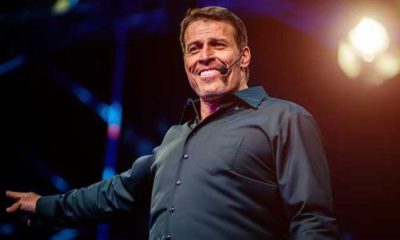Life
My Incredibly Simple Guide To Stoicism – Learn Practical Wisdom You Can Use

I’ve been inspired to learn about Stoicism for a while.
The problem I’ve had is that it’s one of those topics that people love to complicate. The reason for the complication is that many of the teachings that come from Stoicism are spoken in English from a long time ago. I personally don’t have the patience to read this type of writing for long periods.
That’s why I’m going to debunk Stoicism for you in stupidly simple terms. The wisdom you get will transform you. You’ll gain a different perspective that will help you in all aspects of life.
“Everyone is preaching advice, but no one is sharing wisdom – that’s what Stoicism is”
What is Stoicism?
It’s an ancient form of philosophy. It was made famous in recent years again by Tim Ferriss and Ryan Holiday from the USA. These two gentleman credit a lot of their success to the wisdom that Stoicism taught them.
Stoicism began on a stoa which means porch to you and I. A stoa is where the early teachings of Stoicism started.
Here is Stoicism broken down into insanely simple dot points:
– Stoicism is focused on uncomplicated theories of life
– Stoicism is so clear that you can take action from the advice immediately
– Study is not required to understand Stoicism
– The most read Stoic is Lucius Seneca. Marcus Aurelius is also very popular
Stoicism doesn’t focus on the negative like modern-day self-help advice does. Stoicism is more a meditative practice that allows us to take the negative feelings we experience, and turn them into thoughts that give us peacefulness and perspective on life.
The most important part of learning Stoicism is having the right state of mind. Just like in life, the right state of mind can help us look at challenges in the best possible way.
At the crux of Stoicism is a list of reminders and words of wisdom that show how to live a good life. It’s not an argument about what is right and what is wrong. The Stoics had no time for this way of thinking.
Okay so now let’s skip ahead to the best lessons you can learn from Stoicism:
We don’t control events, but we do control what they mean.
This is a famous teaching from a lot of Tony Robbins work too. Everything that happens in your life can be controlled by your own mind to be good or bad. Once you understand this teaching, you can take back the power. You become less reactive and a lot calmer. You have the upper hand.
Disruptions to serenity cannot be avoided.
Tranquillity can never be reached by avoiding or blocking out distractions or horrible events. The way to get to that tranquil place is through your choices and judgment about those events and situations.
You must disrupt yourself.
Doing things the way they’ve always been done will lead you to be disrupted by someone or something who changes with the environment. Operating out of habit means you’ve stopped thinking and are mindlessly drifting through life. This means you’re not in control.
“When you lose control, your environment determines your results”
There’s a good chance that you’re going to think these results suck. The lesson here is break your habits, get out of your comfort zone and disrupt yourself like a cool, hip startup from Silicon Valley.
In good and bad times we have a choice.
Whether you’re in jail or an entrepreneur running the most successful startup on the planet, you have a choice. We all come from different backgrounds and we’ll all go through major highs, and painstaking lows. Through all of these different circumstances, we have a choice.
It’s having the freedom of choice that will set us free in the long run. It’s that freedom of choice that will ensure you don’t waste your life away thinking about stuff you can’t control. You’ll always feel the power of freedom when you control your choices, no matter what life throws at you.
Make it a habit of looking inward.
Stoics are obsessed with taking time to look inward. It’s something they advocate above all of their other teachings. They suggest spending time in the morning to ask yourself questions about your life. As you do this, you’ll find the answers to life’s biggest questions become clearer in the context of your own life.
Looking inward helps you find the answers that you knew all along and thought were hidden inside of someone else, or something else. This practice will only work if you’re honest with yourself. Don’t be too brutal on yourself either. Realize that we all start somewhere and it’s where we can go that is the greatest gift we can enjoy.
Being paranoid and fearful will destroy you.
The antidote to fear and paranoia is self-control. Learn to control your impulses. If you become fearful that others will sabotage your success and you don’t remain in control over these fearful thoughts, you’ll lose sight of reality. These fearful thoughts will cause you to project your fears onto other people and they’ll give you exactly what you fear.
In simple terms, fear is a self-fulfilling prophecy. What you put out comes right back at you.
Anger will not help you.
The Stoics believe that getting angry never gives you anything in return. Anger wastes your precious energy and resources, and provides no tangible benefit. This is why it’s better to practice non-reactivity rather than being pissed off at something you can’t control anyway.
Anger is like a contagious virus that spreads if you let it. Don’t let anger control you. Projecting anger on people can only result in you projecting anger on yourself. That’s why anger is also another self-fulfilling prophecy.
Everything takes up space.
Seneca wrote many times that even things you get for free have a cost. That cost is space – space in your garage or even space in your mind.
“Learning to live with less will create space in your life for the things that truly matter to you”
The aim of the game is to look at your material possession and be honest with yourself: do you really need that object? If the answer is no, free some space up in your life. What Seneca says here is the reason I have personally given away and sold most of my possessions. I’ve never been happier.
Practice poverty.
Especially during prosperous times in your life, the Stoics believe you should practice poverty. This is how you prepare for hardship and become an expert in dealing with the ups and downs of life. Comfort can become a form of slavery because you consistently start to think that someone could take away what you have.
When you’re familiar with what you fear, it no longer controls you. The worst can happen and you go through it with a sense of calmness and ease. People think you’re resilient but actually, you’ve just practiced the hard times as preparation.
Quick tip: try eating a really cheap meal for a whole week every two months. Eat like you have almost no money. This will teach you to not only appreciate the nice meals but to be okay if you ever face poverty and have to live on very little money for a while. I know a few people that do a beans and rice meal for this week of living it rough. Try it!
You protect everything you have, why not your mind?
You don’t give away your wallet to a stranger on the street. You don’t hand the keys to your car over to a budding thief. You wouldn’t let your house be demolished by the council without a fight. So why would you hand over the keys to your mind so easily to any stranger who wants them?
You have to become aware of who you are unconsciously giving your mind over to. You need to realize who is influencing you in a negative way without knowing it.
“Your mind can create all the abundance you could ever imagine, so you need to protect it like it’s the only possession you have”
Don’t wreck the purpose of your life by trying to impress others.
The Stoics teach that the opinions of people you seek our to impress are not that great themselves. These people you seek to impress have addictions, their own problems, and are no wiser than the next person. The purpose of your life is not to impress people and doing so will have the opposite effect.
Focus on impressing yourself through personal growth and wisdom from people who serve the greater good. Go beyond yourself and avoid the need to seek approval. Take action and seek forgiveness later if you must.
Without proper training, you’re a fool.
If you seek to master a skill, then without proper training you will (by default) rely on ignorance, and you’ll act in a way that lacks discipline and requires chance.
“An investor without discipline is not an investor – he’s a gambler” – Ryan Holiday
Your mind becomes what you think consistently.
Whether you think mostly negative thoughts or positive thoughts will determine your default response to any situation. The more we practice negative thinking, the more likely we are to see the world as negative.
If we choose to practice nothing, then we also get the same outcome of an influx of negative thoughts. The only wise choice then is to practice seeing the good in everything. Start with being grateful
You don’t know everything.
This is a thought that many people secretly have when they claim they want to learn something new. The harsh reality is that many of us walk around as though we know everything. We know nothing of the infinite knowledge there is to acquire.
That sort of humbleness is where all the best learning starts from. Thinking less of yourself is the ultimate power: it’s where you can grow from and serve others. It’s this way of thinking that births leaders.
Think of your problems in relation to the sky.
Marcus Aurelius says that the stars wash away the dust of earthly life. This Stoic concept is a way for you to clear your mind of all the troubles you encounter day-to-day. In comparison, your problems are so small compared to the immense size of the universe.
Your problems don’t matter in the grand scheme of things so don’t fool yourself into believing they do. Look at the stars once in a while. Remember how lucky we are even to experience this planet we call Earth.
Forget stereotypes and labels: concentrate on character.
Stoics believe your character should be your most prominent feature. Outward traits such as skin color and clothing should be insignificant. Your character is defined by the work you do on yourself each day and the person you become.
Your character is what sells you as a person better than any other external force. Your character is your legacy. Your character is what you want to be known for.
Don’t sit on the sidelines. Do something inspirational yourself.
You can sit here all day and listen to me inspire you. You can watch all the inspirational videos that Youtube has to offer. What would be far better is to go out there and inspire people yourself rather than being inspired.
Take the inspiration you’ve gathered in your life and do something with it so you can allow others to create their own inspirational journey. Be the example rather than only listening to the example and saying “One day I’ll do that.”
There is never an end to the personal development journey.
You never reach mastery. The student never stops being a student. Even the teacher is still a student at heart. Stoicism is something you apply consistently, and it never ends. You apply it until the day you die and that’s how you gain the infinite wisdom it offers.
“You’ll never drink all the water in the ocean, just like you’ll never learn everything there is to know about Stoic philosophy and that’s fine too”
Work is good for you.
Ever heard that when people retire, they are statistically more likely to die within a few years of achieving this milestone in their life? That’s because work gives us a sense of purpose. Work gives us a reason to get up in the morning. Making progress through doing meaningful work feels good.
Too much idle time and the delusion that you can get rich and sit on a beach is what can cause you to feel empty inside. This feeling can cause you to have self-destructive thoughts that lead to an immense focus on one’s selfish desires and need for significance. In other words, work is good.
Don’t make life harder than it is. It’s your choice.
Choices are what stoics believe are the way to take a shortcut in life. They believe we can choose whatever we want including happiness, freedom, respect and feelings of being wealthy. The reoccurring theme here again is that we are in control of everything that happens and how we feel.
How you handle disaster is everything.
The way you deal with problematic situations is a true test of your character. Character in stoicism is not formed when everything is going right; character is formed when everything is going wrong. Don’t let problems spoil your mindset. Let optimism guide you in all situations.
Seek out obstacles.
Obstacles are a way for you to take a challenge that you may not like and use it as a lesson that can help you for the rest of your life. You learn from hardships above all else. Lessons from hardships make you smarter, stronger and better prepared for when adversity strikes again.
You have one job and only one job.
The Stoics have a core belief that all of us have only one job on Planet Earth: to be a good human being. If you learned nothing else about stoicism from this blog post, then I’ve succeeded.
Practice being a good human being and you’ll have one hell of a life.
If you want to increase your productivity and learn some more valuable life hacks, then join my private mailing list on timdenning.net
Did You Know
How Skilled Migrants Are Building Successful Careers After Moving Countries
Behind every successful skilled migrant career is a mix of resilience, strategy, and navigating systems built for locals.

Moving to a new country for work is exciting, but it can also be unnerving. Skilled migrants leave behind familiar systems, networks, and support to pursue better job opportunities and a better future for their families. (more…)
Life
10 Research-Backed Steps to Create Real Change This New Year
This New Year could finally be the one where you break old patterns and create real, lasting change.

Every New Year, we make plans and set goals, but often repeat old patterns. (more…)
Life
9 Harsh Truths Every Young Man Must Face to Succeed in the Modern World
Before chasing success, every young man needs to face these 9 brutal realities shaping masculinity in the modern world.

Many young men today quietly battle depression, loneliness, and a sense of confusion about who they’re meant to be.
Some blame the lack of deep friendships or romantic relationships. Others feel lost in a digital world that often labels traditional masculinity as “toxic.”
But the truth is this: becoming a man in the modern age takes more than just surviving. It takes resilience, direction, and a willingness to grow even when no one’s watching.
Success doesn’t arrive by accident or luck. It’s built on discipline, sacrifice, and consistency.
Here are 9 harsh truths every young man should know if he wants to thrive, not just survive, in the digital age.
1. Never Use Your Illness as an Excuse
As Dr. Jordan B. Peterson often says, successful people don’t complain; they act.
Your illness, hardship, or struggle shouldn’t define your limits; it should define your motivation. Rest when you must, but always get back up and keep building your dreams. Motivation doesn’t appear magically. It comes after you take action.
Here are five key lessons I’ve learned from Dr. Peterson:
-
Learn to write clearly; clarity of thought makes you dangerous.
-
Read quality literature in your free time.
-
Nurture a strong relationship with your family.
-
Share your ideas publicly; your voice matters.
-
Become a “monster”, powerful, but disciplined enough to control it.
The best leaders and thinkers are grounded. They welcome criticism, adapt quickly, and keep moving forward no matter what.
2. You Can’t Please Everyone And That’s Okay
You don’t need a crowd of people to feel fulfilled. You need a few friends who genuinely accept you for who you are.
If your circle doesn’t bring out your best, it’s okay to walk away. Solitude can be a powerful teacher. It gives you space to understand what you truly want from life. Remember, successful men aren’t people-pleasers; they’re purpose-driven.
3. You Can Control the Process, Not the Outcome
Especially in creative work, writing, business, or content creation, you control effort, not results.
You might publish two articles a day, but you can’t dictate which one will go viral. Focus on mastery, not metrics. Many great writers toiled for years in obscurity before anyone noticed them. Rejection, criticism, and indifference are all part of the path.
The best creators focus on storytelling, not applause.
4. Rejection Is Never Personal
Rejection doesn’t mean you’re unworthy. It simply means your offer, idea, or timing didn’t align.
Every successful person has faced rejection repeatedly. What separates them is persistence and perspective. They see rejection as feedback, not failure. The faster you learn that truth, the faster you’ll grow.
5. Women Value Comfort and Security
Understanding women requires maturity and empathy.
Through books, lectures, and personal growth, I’ve learned that most women desire a man who is grounded, intelligent, confident, emotionally stable, and consistent. Some want humor, others intellect, but nearly all want to feel safe and supported.
Instead of chasing attention, work on self-improvement. Build competence and confidence, and the rest will follow naturally.
6. There’s No Such Thing as Failure, Only Lessons
A powerful lesson from Neuro-Linguistic Programming: failure only exists when you stop trying.
Every mistake brings data. Every setback builds wisdom. The most successful men aren’t fearless. They’ve simply learned to act despite fear.
Be proud of your scars. They’re proof you were brave enough to try.
7. Public Speaking Is an Art Form
Public speaking is one of the most valuable and underrated skills a man can master.
It’s not about perfection; it’s about connection. The best speakers tell stories, inspire confidence, and make people feel seen. They research deeply, speak honestly, and practice relentlessly.
If you can speak well, you can lead, sell, teach, and inspire. Start small, practice at work, in class, or even in front of a mirror, and watch your confidence skyrocket.
8. Teaching Is Leadership in Disguise
Great teachers are not just knowledgeable. They’re brave, compassionate, and disciplined.
Teaching forces you to articulate what you know, and in doing so, you master it at a deeper level. Whether you’re mentoring a peer, leading a team, or sharing insights online, teaching refines your purpose.
Lifelong learners become lifelong leaders.
9. Study Human Nature to Achieve Your Dreams
One of the toughest lessons to accept: most people are self-interested.
That’s not cynicism, it’s human nature. Understanding this helps you navigate relationships, business, and communication more effectively.
Everyone has a darker side, but successful people learn to channel theirs productively into discipline, creativity, and drive.
Psychology isn’t just theory; it’s a toolkit. Learn how people think, act, and decide, and you’ll know how to lead them, influence them, and even understand yourself better.
Final Thoughts
The digital age offers endless opportunities, but only to those who are willing to take responsibility, confront discomfort, and keep improving.
Becoming a man today means embracing the hard truths most avoid.
Because at the end of the day, success isn’t about luck. It’s about who you become when life tests you the most.
Change Your Mindset
The Four Types of Happiness: Which One Are You Living In?
Most people chase success only to find emptiness, this model reveals why true happiness lies somewhere else.

In a world driven by rapid technological growth and constant competition, many people unknowingly trade joy for achievement. (more…)
-

 Health & Fitness1 week ago
Health & Fitness1 week agoWhat Minimalism Actually Means for Your Wellness Choices
-

 Did You Know6 days ago
Did You Know6 days agoWhy Most Online Courses Fail and How to Fix Them
-

 Business7 days ago
Business7 days agoIf Your Business Internet Keeps Letting You Down, Read This
-

 News3 days ago
News3 days agoBrandon Willington Builds 7-Figure Business by Ignoring Almost Everything























2 Comments